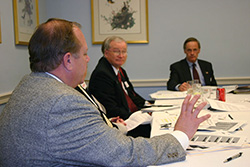
Washington, D.C., March 8, 2006: Sussex County leaders are returning to Delaware today after a successful five-day mission in Washington, where they learned about the latest legislative issues in Congress, how those might affect local governments, and pressed lawmakers for future federal aid.
Sussex County Administrator Robert L. Stickels led a delegation of Sussex County Council members and staff to this year’s National Association of Counties legislative conference in Washington, D.C.
During the five-day conference, Sussex officials joined other attendees from the nation’s 3,000-plus counties in seminars, speeches and workshops that focused on a range of topics. Those included creative approaches to balancing budgets and dealing with the potential loss of federal dollars to disaster preparedness and tax reform.
The annual legislative conference ended today with a luncheon and greet-and-meet session with members of Congress on Capitol Hill. Sussex County Finance Director David B. Baker and Economic Development Director Stephen Masten were among the county’s staff who met with the Delaware congressional delegation, urging those leaders to do what they can to stave off possible cuts to programs, such as Community Development Block Grants, that support counties.
“This is our chance to go to Washington, to sit down with our elected leaders in Congress and impress upon them our needs, and let them know what issues are facing all of us,” said Mr. Baker, who asked the Delaware delegation for its support in saving CDBG money, as well as funding for a planned Nanticoke River dredging project and runway improvements at the Sussex County Airport.
“We realize they are only one out of 100 senators, or one out of more than 400 congressmen, but we have to use this chance to make them aware of how important this funding is and what it means to all Sussex Countians,” Mr. Baker said.
The five-day conference also gave county leaders a chance to gain knowledge on other issues, including land use, budgeting, disaster preparedness and immigration.
“This is the 25th one of these that I have attended, and over the years, I’ve come to rely upon these annual conferences as an important part of my continuing education,” Mr. Stickels said. “Each time you pick up something that helps you in some way, maybe not immediately, but eventually, in how you manage and lead your county.”
One conference, back in the late 1980s, featured a discussion on the enormous cost of taxpayer-funded, county-provided solid waste programs and how best to pay for those services. Mr. Stickels said that presentation, in part, led the County Council to move its trash transfer service from taxpayer-subsidized to fee-based.
That move, and an ultimate halt to the service, saved the county $2 million. That knowledge and insight from experts gave Sussex County leaders a new idea, Mr. Stickels said, and freed funding for more critical programs, such as the formation of a paramedic program.
“That’s a perfect example of learning something and putting it to good use,” Mr. Stickels said. “In government, you always have to be looking for fresh and innovative ideas if you’re going to provide the best services possible to your constituents.”
